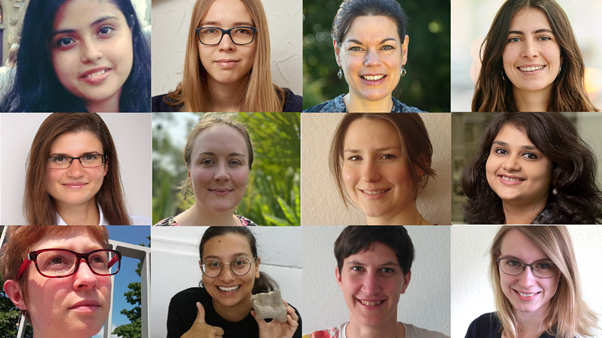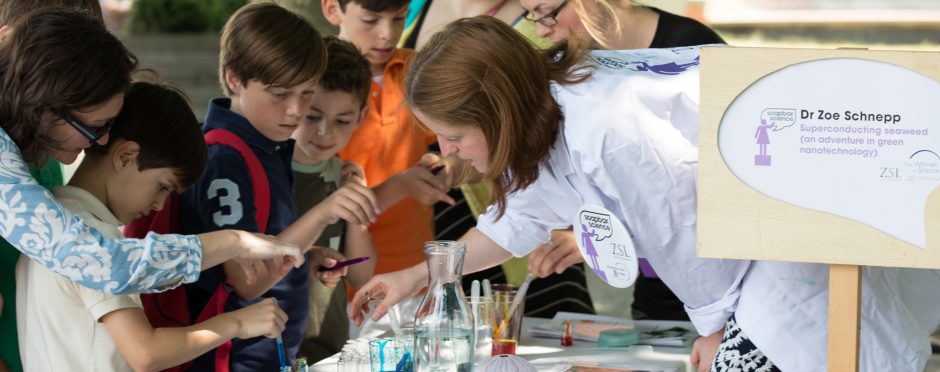This year Soapbox Science Rhineland will take place at the Rudolfplatz in Cologne. It brings together female scientist from Düsseldorf, Bonn, Cologne and also other parts of Germany. Speakers will talk about topics like plant science, immunology and aging research. Come around and join the talks and discussions.
Sponsors
We couldn’t run this event without the generous logistical and financial support of our sponsors.
ImmunoSensation2 – University of Bonn
ImmunoSensation2 is a DFG-funded Cluster of Excellence dedicated to investigating innate immunity beyond the boundaries of classical immunology, which we term the immune sensory system. Our scientists include immunologists, neurobiologists, system biologists and mathematicians from University of Bonn Medical Faculty and Faculty of Mathematics and Natural Sciences and the German Center for Neurodegenerative Diseases (DZNE) of the Helmholtz-Society.
Founded in 2012, ImmunoSensation2 is currently in its ninth year of funding, and we continue to pursue our mission of innovative science in immunology, with a focus on connecting immunology to other systems, such as the metabolic system and the nervous system, and better understanding the intimate connection between the immune sensory system and human health and disease. More information about ImmunoSensation2 can be found at https://www.immunosensation.de/home.html
We age with every hour, minute, second and in every moment. At the Cologne Cluster of Excellence CECAD (Cellular Stress Response in Aging-Associated Diseases), the central question is “Why and how do we age?”. The goal: to understand and uncover the processes in our cells in order to find new approaches for the prevention, diagnosis and treatment of age-related diseases. In old age, the risk of cardiovascular disease, diabetes, cancer, kidney disease and dementia increases rapidly. At CECAD, scientists and physicians work together to understand the processes in the cell as well as the interactions between tissues and organs and the influence of the environment on the aging organism. More information about CECAD can be found at: https://www.cecad.uni-koeln.de/home/
The Cluster of Excellence on Plant Sciences CEPLAS addresses the grand challenges of sustainable food production and ecosystem maintenance through world-class fundamental research on complex plant traits of agronomic relevance that impact on yield and adaptation to limited resources. CEPLAS integrates the resources of the Universities of Cologne and Düsseldorf, the Max Planck Institute for Plant Breeding Research, and the Forschungszentrum Jülich into an internationally leading plant science centre that attracts world-class faculty and junior researchers. Apart from excellent science, CEPLAS focusses on science communication and the promotion of early career researchers, especially female researchers. More information about CEPLAS can be found at: https://www.ceplas.eu/en/home/
Bürgeruniversität Düsseldorf – Heinrich Heine University Düsseldorf
As a “citizens’ university” (Bürgeruniversität), Heinrich Heine University actively promotes public engagement. The aim is to make scientific findings more accessible and understandable for the general public, to contribute to the acceptance of research results and, conversely, to allow impulses from society to flow back into research. HHU offers various funding opportunities for this purpose, from Citizen Science to science communication projects and service learning, as well as numerous events for the public. https://www.buergeruni.hhu.de/
Collaborative Research Center 1208
The CRC 1208 “Identity and Dynamics of Membrane Systems – from Molecules to Cellular Functions”, funded by the German Research Foundation, addresses fundamental questions about the identity and dynamics of membrane systems. A prerequisite for life is that membranes are not static entities but comprise constantly changing boundaries that react in response to internal and external cues. Our multidisciplinary approach, starting from both, the level of individual membrane proteins and their complexes as well as entire cellular membrane systems, is carried out on different unicellular and multicellular organisms (plant, medical, animal, fungal and bacterial systems). The CRC combines a unique range of structural, biochemical and cellular techniques and aims to determine the multidimensional interaction of the individual components of different membrane systems and the membrane as a unit (for further information see: https://www.sfb1208.hhu.de/en/)
Details of the location and timing of the event
Date: 21.08.2021
Location: Rudolfplatz, Cologne
Time: 2 – 6 pm
Speakers
Selected from a competitive pool of researchers, our 12 speakers will be sharing their work in technology, science, medicine and engineering. The speakers and their discussion topics are:
Dr. Adélaïde Raguin, Institute for Quanitative and Theoretical Biology, CEPLAS Heinrich Heine University Düsseldorf, “How to move inside a cell?”
Dr. Alisandra K. Denton (@AlisandraDenton), Institute of Plant Biochemistry, CEPLAS Heinrich Heine University Düsseldorf, “Applying machine learning to read the information stored in our DNA.”
Dr. rer. nat. Anette Christ, Institute of Innate Immunity, University Hospital Bonn, “FastFood – was macht es mit unserem Immunsystem?”
Blanca Jurado-Mestre, Institute of Molecular Medicine and Experimental Immunology, UKB Bonn, “The importance of of the recovery after an immune response.”
Ekaterina Ponomareva, Institute of Colloids and Nanooptics, Heinrich Heine University Düsseldorf, “Faszinierende Welt der Gold “Zwerge”!”
Harshita Kaul (@HARSHITAKAUL), CECAD Research Center Cologne, “Can mild stress be beneficial?… Life lessons learnt from biology, an insight into Mito-hormesis”
Kathrin Dorn, ML4Q Cluster Heinrich Heine University Düsseldorf, “Schrödingers Katze: Was eine Katze in der Box für die Physik bedeutet.”
Priyamedha Sengupta, Institute for Plant Sciences, CEPLAS University of Cologne, “Frontline workers: How microbes protect plants.”
Dr. rer. nat. Sabrina Bennstein (@sbennstein), Institute of Transplantation Diagnostics and Cell Therapeutics, UKD Düsseldorf, “Wie funktioniert unser Immunsystem?”
Dr. Shyama Vermeersch (@Shyama_Ver), University of Tübingen, “Essen der Vergangenheit, das südlevantinische Menü 5500 – 3500 v.u.Z.”
Sonia Ravanelli, The Hoppe Lab – Proteostasis in Development and Aging, CECAD Research Center Cologne, “The adventure of a curious scientist and her little worm assistants.”
Wibke Schumann, IBI-7: Structural Biochemistry, Forschungszentrum Jülich Heinrich Heine University, “Molekulare Maschinen: Klappmesser und Kabelbinder auf der atomaren Skala.”
Discover our 2021 speakers:

Top left to bottom right: Priyamedha Sengupta, Wibke Schumann, Dr. rer. nat. Anette Christ, Blanca Jurado Mestre, Ekaterina Ponomareva, Dr. Adélaïde Raguin, Dr. rer. nat. Sabrina Bianca Bennstein, Harshita Kaul, Sonia Ravanelli, Dr. Shyama Vermeersch, Dr. Alisandra K. Denton, Kathrin Dorn
Organizers

From left to right: Chiara Bruno, Dr. Anna Euteneuer, Dr. Elisabeth Jurack, Sophie Krimmer, M.Sc. Marie-Luise Hebestreit; Contact: soapboxrhineland@gmail.com
Chiara Bruno is a renewable energy engineer with several years of experience in project management and optimization in RWE Renewables. RWE Renewables is a global organisation leader in development, construction and operation of renewable energy projects, especially Wind Onshore and Offshore, Solar PV and Battery Storage. RWE Renewables has employees in more than 20 countries and promotes diversity and inclusion among its employees. The RWE group aims to be carbon neutral by 2040.
Dr. Anna Euteneuer is working for the Cluster of Excellence in Aging Research CECAD at the University of Cologne. CECAD actively promotes equality in research with the long-term goal of having well-balanced proportions of women and men within the Cluster of Excellence. CECAD is therefore committed to the ‘Keep Women on the Scientific Career Path’ action plan. With Co-organizing Soapbox Science CECAD aims at inspiring current and future female scientist in their career choices.
Dr. Elisabeth Jurack and Sophie Krimmer are both working the Cluster of Excellence ImmunoSensation of the University of Bonn. ImmunoSensation has taken great efforts to guarantee gender equality, to increase the representation of female scientists at all levels, and to specifically support female scientists to the higher ranks of academic careers. It is therefore a great pleasure for the two to co-organise Soapbox Science in the Rhineland as well, as it is a great opportunity to give female scientist a stage for their research.
M.Sc. Marie-Luise Hebestreit is a PhD student in Physical Chemistry at Heinrich Heine University Düsseldorf, specialized on high resolution laser induced fluorescence spectroscopy. She commit herself to a program which helps students at university who are not from an academic background. Marie-Luise has great interest in this topic, because she is as well the first member of her family to visit university. Since she was a speaker at SoapboxScience Düsseldorf in 2020 she dived into the field of science communication and promoting women in science.





